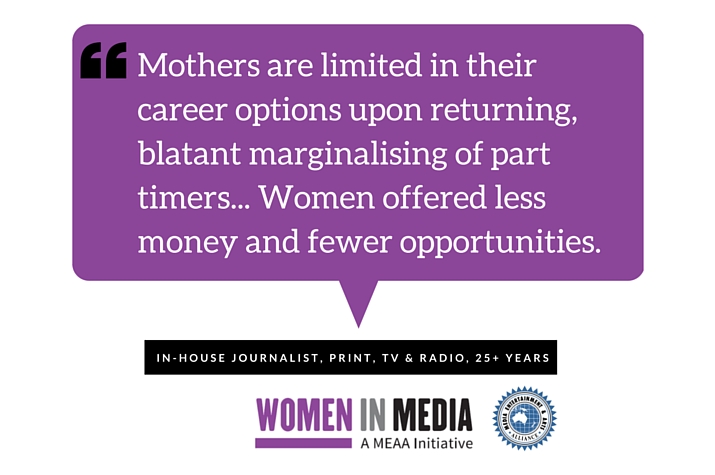Women put on ‘mummy track’ after returning to work

One in four women experience difficulty returning to work in the media after taking parental leave, according to a new report.
Despite the majority of media organisations providing paid parental leave (87%) and other forms of flexible working (62%), these policies appear to be “on paper, not in practice”.
The survey of more than 1000 workers was conducted by Women in Media, a mentoring and networking group supported by the Media, Entertainment and Arts Alliance.
Many women reported a culture of “presenteeism” and “mummy tracking”. Others were forced to resign because they weren’t given the option to return to work part time after maternity leave.
These findings are in line with a 2014 report by the Australian Human Rights Commission, which found half of mothers (49%) and more than a quarter (27%) of fathers/partners experienced discrimination in the workplace during pregnancy, parental leave or on return to work.
National convenor of Women in Media, Tracey Spicer, said it was disappointing there were still big barriers to women returning to work: “Media organisations are losing a wealth of talent, by failing to support all women trying to return to work. Sadly, women are leaving the industry as a result.”
She is calling for cultural change in media workplaces, so men feel more comfortable taking paternity leave.
Katelin McInerney, director of MEAA’s Media section, said: “In practice, this would mean companies would stop penalising their female workforce for falling pregnant and taking the necessary leave, paying superannuation for periods of parental leave and implementing concrete measures that shift negative stereotypes around productivity and flexible work so that family friendly practices are seen as a normal and necessary part of working life.”
The survey was developed by the national steering committee of Women in Media, backed by the Media Entertainment and Arts Alliance, researcher Beverley Uther, and iSentia. It collected data from 1054 Australian journalists between September and December 2015, with 91.8% of the respondents being women. Read the full report here.
What they said on discrimination
“As such a 24/7 industry, taking time for yourself or to care for a family etc. can be challenging. It is often looked down on if you're not ‘on call’ all the time and this can be particularly hard for women who are more commonly in carer roles. Also a youth/singlehood stigma (not exclusive to the media) that without a family etc. to care for you should be more available and on call.”
Communications manager, online, less than five years experience
“Workplaces need to become more flexible to accommodate the needs of men and women balancing work and family life.”
Freelance journalist, television, more than 25 years experience
“Equal pay for equal work, not penalising women for taking time off to tend to their children, employers providing flexible hours so both men and women can attend children’s school events and pick up and drop them off. Boundaries set around time spent working on social media.”
Editor/Produce, Print and Online, 5-10 years experience
“Fair internship principles and also better career trajectories for women having families. It is also a big shame that women are unlikely to be managers or on leadership boards.”
Freelance journalist, Print and Online, less than five years experience
“Mothers are limited in their career options upon returning, blatant marginalising of part timers… women offered less money and fewer opportunities.”
In-house journalist, print, television, radio, more than 25 years experience
“There is nothing about maternity leave mentioned in our contracts, and I know they are not strong believers in flexibility — therefore having children will prohibit women from being able to keep their jobs, even though they could do it all remotely and at different hours than 9-6.”
In-house journalist, online, 5-10 years experience
“Statements about women on maternity leave, looking to return to the workforce made me feel like (although there is a policy in place) women who get pregnant and go on leave are an inconvenience if they are unable to return to full-time work. Responsibility is often given, but without the authority to perform a role to its full extent (i.e. a manager does not have sign off responsibilities for his/her staff leave but has to carry out performance reviews and discipline).”
Editor/Producer, Print, 5-10 years experience